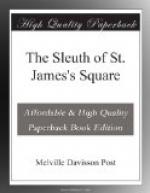“But you can, watch the steamer,” said Hargrave, “the Don Carlos.”
The Baronet laughed.
“There’s no such steamer!” He got up and began to walk round the table. “Nine hundred horses,” he said. “This thing has got to stop. They’re on the sea now, on the way over from America: We have got to find out where they will go ashore.”
He stopped, stooped over and studied the message which he had written out and which also lay before him in the three newspapers.
“It’s there,” he said, “the name of the port of arrival, somewhere in those two sentences. But I can’t get at it. It’s no cipher that I have ever heard of. It’s no one of the hundred figure or number ciphers that the experts in the department know anything about. If we knew the port of arrival we could pick up the clever gentleman who comes to take away the horses. But what’s the port — English, French or Dutch? There are a score of ports.” He struck the paper with his hand. “It’s there, my word for it, if we could only decode the thing.”
Then he stood up, his face lifted, his fingers linked behind his back. He crossed the room and stood looking out at the thin yellow fog drifting over Piccadilly Circus. Finally he came back, gathered up his papers and put them in the pocket of his big tweed coat.
“There’s one man in Europe,” he said, “who can read this thing. That’s the Swiss expert criminologist, old Arnold, of Zurich. He’s lecturing at the Sorbonne in Paris. I’m going to see him.”
Then he went out.
Now that, as has been said, is how the thing began. It was the first episode in the series of events that began to go forward on this extraordinary night. One will say that the purchasing agent for a great New York jewel house ought to be accustomed to adventures. The writers of romance have stimulated that fancy. But the fact is that such persons are practical people. They never do any of the things that the story writers tell us. They never carry jewels about with them. Of course they know the police departments of foreign cities. All jewel dealers make a point of that. Hargrave’s father was an old friend of Sir Henry Marquis, chief of the C. I. D., and the young man always went to see him when he happened in London. That explains the freedom of his talk to Hargrave on this night in the Empire Club in Piccadilly.
The young man went over and sat down by the fire. The big room was empty. The sounds outside seemed muffled and distant. The incident that had just passed impressed him. He wondered why people should imagine that a purchasing agent of a jewel house must be a sort of expert in the devices of mystery. As has been said, the thing’s a notion. Everything is shipped through reliable transportation companies and insured. There was much more mystery in a shipload of horses — the nine hundred horses that were galloping through the head of Sir Henry Marquis — than in all the five prosaic years during which young Hargrave had succeeded his father as a jewel buyer. The American was impressed by this mystery of the nine hundred horses. Sir Henry had said it was a mystery in every direction.




